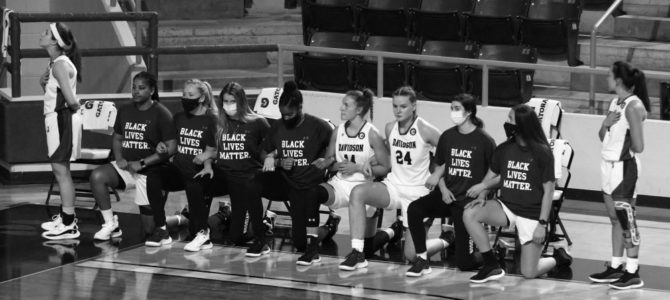
“Black Lives Matter is not political, it’s basic human rights,” my coaching staff and teammates heading our new “Call to Action Committee” told me and the other team members after practice. They were responding to some of the concerns I had expressed prior to the team meeting.
By the next game, while running out of the tunnel 10 of my 13 Davidson College teammates and all four of my coaches were wearing T-shirts with “Black Lives Matter” bannered across the front. When the national anthem played and with our U.S. Army veteran team doctor behind us, most of my team dropped to one knee in protest of America’s “institutional racism.”
The virtue signaling was clear: those wearing the T-shirt and those on their knees supported basic human rights, and the rest of us simply did not.
Political messaging in sports isn’t new, but the grip and scale this possesses over sports is. Administrators providing collegiate athletes the platform to speak out on important issues has transformed athletics into a system of coercive speech. Today, athletes and coaches with fashionable views are pressuring their programs into mirroring their beliefs and being applauded by the media and universities for doing it. But is anyone stopping for a moment to question whether the players protesting really want to be?
The partisan social justice messaging on such public display unjustly forced me to make a choice between compromising my beliefs in front of my family and friends or “out” myself as someone holding different opinions. I chose the latter, but in the face of cancel culture and team pressures other athletes are understandably not as willing.
Numerous popular social justice initiatives are tied to partisan politics, and their symbolic nature and all-or-nothing approach leaves no room for nuanced opinions or discussion. From the audience’s perspective, you’re either wearing the shirt or you’re not, you’re either kneeling for the anthem or you’re standing. The campaigns are designed to publicly lump non-participants into a category of ignorance that inevitably leads to divisions and frustrations within the locker room.
But the fact is, Black Lives Matter—something any decent person affirms as a concept—titles an organization that is not devoted to uplifting black communities but funneling millions of donations to prominent Democrats and promoting neo-Marxist social chaos. Regardless of where you fall on the aisle, such a blatant political affiliation makes it clear this isn’t simply about human rights.
Further, this currently dominant movement that claims it wants to end “systemic racism” has cost black communities billions of dollars in damages, destroyed their local businesses, and directly resulted in the loss of at least 19 lives, most of whom were black. Research into the effect of mass media attention this movement aims to create finds homicide rates in these communities soaring from the de-policing and mistrust their messages foster.
Therefore, as someone who cares deeply about black lives, I could not embrace something that was so obviously harming them. But rather than engaging with these shortcomings, I, along with many other athletes, face this unfair ultimatum.
Additionally worrisome is that athletic staff well knew the dilemma we faced. Discussions behind closed doors all ended with the same unsatisfying response: “There’s nothing I can do.”
Coaches and administrators fear the potential public response of placing any boundaries on this type of speech at college competition. They too feel compelled to recite this political messaging even if they don’t fully believe in its merits. This fear of scrutiny indicates the movement’s real intensions to propel a single narrative without any critical examination.
If we’re truly interested in protecting black lives, however, there should be a willingness to explore more ideas in pursuit of that shared goal. Issues of racial disparities are important yet complex. They don’t deserve to be left to this performative and partisan messaging.
Social media and the connectivity of the internet have opened countless platforms for athletes to publicly express their personal opinions. That is why, in a setting where cohesiveness is everything, athletic leadership should not encourage or feel compelled to promote a movement designed to silence and divide. It’s time we get back to playing sports, not politics.









